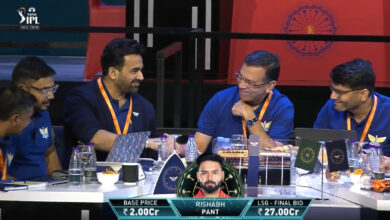Seamers rein in RR batsmen before Marsh takes charge to keep DC afloat in playoffs race

With pitches tiring in the Indian Premier League, it has become a bit tricky to decide what to do at the toss. But Delhi Capitals’ call to chase on a dry surface proved to be the right one as they restricted Rajasthan Royals to 160 for 6. Mitchell Marsh then made good use of more favourable batting conditions in the chase to bludgeon up a big win with 11 deliveries and eight wickets to spare.
Sakariya sees off Buttler
In the season’s first meeting between these sides, Jos Buttler had lit up Wankhede Stadium with an unbeaten 116 off 65 deliveries, nine of which went for sixes. There would be just six sixes in the entire RR innings in the return match at DY Patil Stadium, and none of those were to be from Buttler’s bat, as Chetan Sakariya sent him back in the third over itself.
Sakariya does not have the extra pace Buttler likes on the bat at the start, and one could see he was getting restless against the left-armer. Sakariya was getting it to cut in, and had already flicked Buttler’s pad on the way to the wicketkeeper, causing a loud caught-behind appeal. Buttler even tried walking down the track but just wasn’t middling it.
Sakariya does not have the extra pace Buttler likes on the bat at the start. (Source: iplt20.com)
After six dots in eight balls from Sakariya, Buttler turned to his preferred jailbreak method – the forced hit over mid-on, but only dragged it straight to the fielder off the inside half of the bat.
Sakariya would remain hard to get away for the rest of his spell, and send back Riyan Parag in the 18th over with a back-of-the-hand slower seam-up ball.
Sticking it in
That was to be a feature of the RR dismissals. The ball would hold up in the pitch, even from a good length, and trying to force the pace too much would result in mishits. Ashwin tried to make some room and clear mid-off but failed off Marsh; Sanju Samson met the same fate as he tried to loft the much quicker Anrich Nortje over mid-on, the extra speed only made the mishit go much higher.
Early in his spell, Marsh would bang a cutter into the surface, and Yashasvi Jaiswal’s awkward pull was a simple take for deep square leg on the longer boundary. It may not have been as straightforward a catch if the hit had been to the shorter square rope – the difference between the two sides was around 6-7 metres – but as Marsh said later, he used the bigger boundary well.
No big finish
RR had sent Ashwin at No. 3, and Shimron Hetmyer’s absence as a finisher could have been a factor in elongating the batting order thus. And even though Ashwin, with a career strike rate of 116.60, did well to make 50 off 38 – his maiden T20 half-century – RR didn’t get the big finish they would have wanted.
Ashwin hit 50 off 38 balls. (Source: iplt20.com)
They lost Samson, Parag and Devdutt Padikkal in the 17th, 18th and 19th overs. And No. 7 Rassie van der Dussen, playing his first match since April 14, wasn’t able to connect the boundaries in the 10 deliveries he faced at the end. So, RR managed just 44 off the last five overs.
Nervy Marsh takes charge
After the first three overs of their chase, DC had scored five runs. The in-swinging threat of Trent Boult was keeping David Warner cautious and Marsh clueless. Boult had hurled in a curling yorker on which Marsh had got some bat in the nick of time, but the New Zealander was interested in a leg-before shout. And the noise-meter and replays would suggest that before the bat came down, the ball had just shaved the pad. Marsh was on 1 then, and was surviving with inside edges as he kept expecting the inswinger.
Marsh and Warner regered the highest partnership for us this season as we aced the chase 😌💙#YehHaiNayiDilli | #IPL2022 | #RRvDC | #TATAIPL | #IPL | #DelhiCapitals pic.twitter.com/NyFXqjB9mJ
— Delhi Capitals (@DelhiCapitals) May 11, 2022
He would go on to launch seven sixes in his 89 off 62 to shut RR out of the game, even as Warner’s struggles at the other end gave them some hope. The ball certainly came onto the bat better during the chase, and Marsh began to time and muscle his assorted hits. Pick-ups off the pad, straight sledgehammers into the sightscreen, pulls, mows – he had the shot ready when the asking rate would begin to approach double figures.
Meanwhile, Warner could have got out three times in Yuzvendra Chahal’s first over alone. Deep square leg was a few feet inside the rope as Warner heaved a short ball just over the fielder; he mishit the next one so much that long-off could not get to the chance despite sprinting in. And the last ball of the over beat him and actually brushed the stumps but the bails did not come off.
Nevertheless, Warner managed to hang on to the edge of the cliff until the very end in a second-wicket stand of 144 with Marsh in just under 17 overs. The win also bumped up DC’s net run-rate to the best in the table outside the top three sides.







